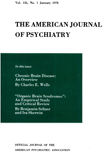Electroconvulsive therapy for iatrogenic hypothalamic-hypopituitarism (CRF-ACTH type)
Abstract
A 41-year-old man with hypothalamic hypopituitarism (CRF-ACTH type) that persisted for 2 years after discontinuation of exogenous dexamethasone was treated with bilateral ECT for severe chronic depression. The depression improved only evanescently after 17 ECT sessions but the hypothalamic-pituitary suppression cleared completely and permanently, based on responses to four metyrapone stress tests in a 2-year follow-up period. ECT may be an effective treatment for persistent hypothalamic-pituitary suppression, even in the absence of a psychiatric disorder.
Access content
To read the fulltext, please use one of the options below to sign in or purchase access.- Personal login
- Institutional Login
- Sign in via OpenAthens
- Register for access
-
Please login/register if you wish to pair your device and check access availability.
Not a subscriber?
PsychiatryOnline subscription options offer access to the DSM-5 library, books, journals, CME, and patient resources. This all-in-one virtual library provides psychiatrists and mental health professionals with key resources for diagnosis, treatment, research, and professional development.
Need more help? PsychiatryOnline Customer Service may be reached by emailing [email protected] or by calling 800-368-5777 (in the U.S.) or 703-907-7322 (outside the U.S.).



